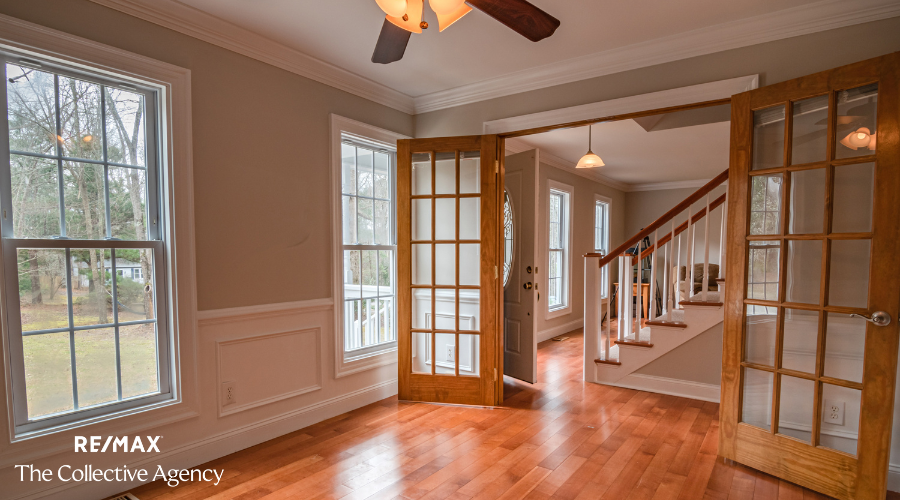Selling a house in Troy, MI? It’s often said that you need to make your home perfect before putting it on the market. However, not every repair or upgrade is worth your time and money. Some fixes may seem important but could actually be a waste of resources when preparing for sale. That’s right – there are things you can leave as-is when selling your home! This blog post will guide you through what not to fix when selling a house.
Unsure about which repairs to tackle and which ones to let go of? Don’t worry; we’ve got this covered. We’ll explore five areas where holding back might be the best strategy for both your wallet and peace of mind during the sales process.
So sit tight, grab a cup of coffee, and get ready to learn some valuable real estate tips that could save you significant time, effort, and cash during your home-selling journey! Let’s dive right into 5 Things Not To Fix When Selling Your Home.
Don’t forget: knowledge is power – especially in real estate! Let’s empower ourselves with these insider insights from top local agents.
Consult With A Top Local Agent Before Making Any Repairs
First and foremost, consulting with a knowledgeable local real estate agent is critical before you undertake any repairs or upgrades. These professionals have their fingers on the pulse of the market in your area – Troy, MI, in our case.
Local agents know what buyers seek and can advise you based on recent trends. They also understand which improvements will likely increase your home’s value versus those that won’t make a significant difference.
Remember, not all buyers expect an entirely refurbished property when house hunting. Some prefer to add their personal touch post-purchase; others may be seeking potential bargains where they can carry out renovations themselves. Your local agent will help identify such prospects and target them effectively.
Moreover, these agents often have trusted networks of contractors who can provide repair services at reasonable rates if necessary repairs are identified. This could save you from overspending on fixes that might seem urgent but aren’t actually essential for selling purposes.
Also worth noting: some defects found during pre-sale inspections may legally need disclosures to prospective buyers depending upon the laws governing property sales within Michigan state guidelines. An experienced local agent would guide you through this legal maze as well!
Bear in mind that while DIY fixes may seem cost-saving initially, they might discourage potential buyers if done poorly. Always seek expert advice before starting any DIY project intended for home sale preparations! In essence – there’s no substitute for professional guidance when it comes to preparing your house for sale.
Determine If The Cost Of Repair Will Be Recouped
When it comes to selling your home, one of the key considerations is determining which repairs are worth making before listing. While some repairs may be necessary for safety or structural reasons, there are others that you may want to think twice about. One important factor to consider is whether the repair cost will be recouped in the sale price.
Before diving into any repairs, consulting with a top local agent is crucial. They have extensive knowledge and experience in the market and can provide valuable insights into what buyers prioritize in your area. They can help determine if certain repairs are necessary or if they would simply be cosmetic enhancements that won’t significantly impact your selling price.
Next, it’s essential to assess whether a particular repair’s cost will add value to your home. Some repairs, such as fixing minor cracks or replacing worn carpeting, may not yield a higher return on investment compared to their actual cost. It’s always wise to weigh these factors carefully before spending money on improvements that won’t necessarily pay off in terms of increasing your home’s value.
Another thing you should consider when deciding which repairs are worth making is avoiding vanity fixes. These upgrades or renovations reflect personal taste but might not appeal universally to potential buyers. While it’s tempting to invest in flashy fixtures or bold paint colors, remember that you’re trying to attract a broad range of buyers who may have different preferences.
Identify And Rule Out Vanity Fixes
When it comes to selling your home, it’s important to prioritize the repairs and upgrades that will actually make a difference in attracting buyers. One thing you should definitely identify and rule out is vanity fixes. These cosmetic changes or upgrades may not necessarily increase the value of your home or appeal to potential buyers.
Vanity fixes could include things like replacing perfectly functional countertops with expensive marble ones or installing elaborate light fixtures throughout the house. While these changes might be aesthetically pleasing, they may not provide a significant return on investment when it comes time to sell.
Instead of focusing on vanity fixes, consider making practical updates with broader appeal. For example, addressing any major structural issues or upgrading outdated systems such as plumbing and HVAC can make a bigger impact on buyers’ decision-making process.
1. Cosmetic Flaws
When it comes to selling your home, you may feel overwhelmed by the number of repairs and upgrades needed. However, not all fixes are worth your time and money. Cosmetic flaws are one category of issues you can consider leaving.
- First impressions matter, but don’t sweat the small stuff. While making a good impression on potential buyers is important, minor cosmetic flaws such as scuffs on walls or chipped paint can easily be overlooked. Remember, most buyers expect some wear and tear in a used home.
- Cosmetic flaws are often subjective. What bothers one person may not bother another. So instead of fixing every imperfection in your home, focus on ensuring it’s clean and well-maintained overall.
- Additionally, tackling cosmetic repairs can be expensive and time-consuming, depending on the extent of the work needed. It’s essential to strike a balance between cost-effectiveness and improving the appeal of your home.
- Focus on major updates instead! Buyers tend to prioritize things like updated kitchens or bathrooms over small aesthetic blemishes like wall cracks or outdated fixtures.
- Keep in mind that during negotiations for closing costs or purchase price adjustments, buyers may use these cosmetic flaws as bargaining chips regardless of whether they have been fixed or not.
- Instead of worrying about every little flaw yourself, consult a top local agent with experience selling homes in your area before making any repairs or upgrades. Finding an experienced agent will help guide you through this process and provide valuable advice about what truly matters when preparing your Sterling Heights house for sale—saving you both time and money in unnecessary renovations!
So remember: while first impressions do count when selling your home, focusing too much on cosmetic flaws could end up being counterproductive for both your wallet and stress levels!
2. Minor Electrical Issues
When it comes to selling your home, some repairs just aren’t worth the time and money. One area where you can save some hassle is minor electrical issues. While it may be tempting to fix every little problem before putting your house on the market, there are a few key things to consider.
First and foremost, consult with a top local agent before making any repairs. They will have a good understanding of what buyers in your area are looking for and can provide valuable insight into whether or not fixing the electrical issues will make a difference in attracting potential buyers.
Next, determine if the repair cost will be recouped when you sell your home. Minor electrical issues such as loose outlets or faulty switches may not significantly impact the value of your property. In fact, spending money on these repairs might actually eat into any potential profit you could make from selling your home.
Now let’s look specifically at minor electrical issues themselves: cosmetic flaws like outdated light fixtures or mismatched switch plates can easily be overlooked by most buyers since they’re relatively simple fixes that don’t require major rewiring work.
Similarly, minor wiring problems such as non-functioning outlets or flickering lights can usually be addressed without difficulty by an electrician hired by the new owner after closing.
Cracked outlets or broken light switches should also fall under this category – while they might seem like big red flags to you as the seller, many buyers would likely prefer to handle these small repairs themselves rather than pay extra for them upfront.
3. Driveway Or Walkway Cracks
One such repair that may not be worth your time is fixing driveway or walkway cracks. While these cracks can certainly detract from the overall appearance of your property, they may not necessarily need immediate attention before putting your home on the market.
Minor cracks caused by normal wear and tear are common in many homes and do not necessarily indicate underlying structural issues. Potential buyers understand this fact and often overlook these types of cosmetic flaws if they don’t pose a safety hazard or affect functionality.
If there are major structural concerns with your driveway or walkway due to extensive cracking, sinking, or heaving, it is recommended to address those issues as they could impact safety and curb appeal. However, for minor surface-level cracking that doesn’t present any significant problems, it may be best to leave them as-is rather than invest substantial amounts into repairs that won’t greatly impact buyer interest.
In conclusion, evaluating each repair individually before listing your home is crucial when looking at cost vs benefit analysis.
4. Old Appliances
When it comes to selling your home, you may be tempted to replace all of your old appliances in order to attract potential buyers. However, this can be a costly mistake that may not yield a high return on investment.
- Cost considerations: It’s important to consider the cost involved before rushing out and buying new appliances. New appliances can be expensive, and you may not recoup the full amount when selling your home. It’s essential to consult with a top local agent who understands the market and can provide guidance on whether replacing old appliances is necessary.
- Age doesn’t always matter: While having brand-new appliances certainly has its appeal, many buyers are more interested in the overall condition and functionality of the home rather than how new the appliances are. If your older appliances are still in good working order and have been well-maintained, they may not need to be replaced.
- Focus on other upgrades: Instead of spending money on replacing old appliances, consider investing in other areas that will have a greater impact on potential buyers’ perception of your home’s value – such as updating bathrooms or kitchens or improving curb appeal.
- Negotiation power: In some cases, keeping older appliances intact could work in your favor during negotiations with buyers who prefer specific brands or styles of their choice.
- Energy-efficient features: If any of your older appliances are energy inefficient, replacing them with more efficient models might make sense before selling your house since energy efficiency is attractive to many buyers.
- Space limitations: Newer appliance models often come with larger dimensions which might require modifications or adjustments within existing kitchen layouts, which isn’t feasible for every homeowner given space constraints hence opting out from upgrading would serve better
- Market demand: Finally, take into consideration what other homes currently listed for sale offer regarding their kitchen amenities. If similar properties aren’t including upgraded stainless steel double ovens, then upgrading yours may not be necessary to compete in the market.
5. Partial Room Upgrades
When it comes to selling your home, you may feel tempted to undertake partial room upgrades to increase its value and appeal. However, this is another area where caution is advised.
While it’s true that a beautifully renovated kitchen or bathroom can have a significant impact on buyers, doing only half the job can actually backfire. Incomplete room upgrades can create an unbalanced look and leave potential buyers wondering why you didn’t finish the job properly.
For example, installing new countertops without updating the cabinets or replacing outdated light fixtures without addressing other aspects of the room’s design can make your efforts seem disjointed and haphazard.
Instead of investing time and money into partial room upgrades, consider focusing on overall cleanliness, decluttering, and simple staging techniques that showcase each space’s potential. These changes are often more cost-effective and have a greater impact on buyers’ perception of your home.
RE/MAX, The Collective Agency Can Guide You Through The Process
Selling a home requires careful consideration when deciding what repairs or improvements to make before listing it on the market. While there are certainly instances where certain fixes are necessary or beneficial, there are also things that don’t need fixing at all.
By consulting with a top local agent, like those at RE/MAX, The Collective Agency, when determining which repairs will provide the best return on investment and ruling out vanity fixes that won’t add substantial value to your property, you’ll be able to focus on what truly matters: presenting your home in its best possible light. Contact RE/MAX, The Collective Agency today!






